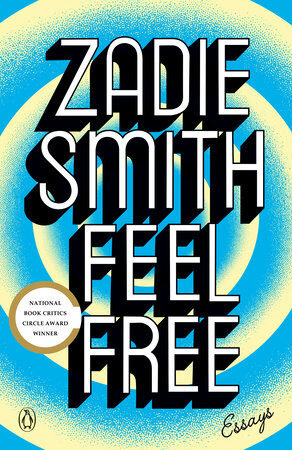Feel Free
by Zadie Smith
reviewed by Lisa Mullenneaux
Anyone familiar with the writings of Zadie Smith—as a novelist or cultural critic—knows she isn’t afraid to tackle explosive topics. So while the title of her new essay collection suggests follow-your-bliss easy reading, its contents contain her signature thoughtful analyses of tough topics like Britain’s EU exit, US race relations, and Mark Zuckerberg.
Start with “The Buddha of Suburbia” for an affectionate tribute to Harif Kureishi’s 1991 novel as a rite of passage, especially for Smith and her peers, mixed-race kids growing up in northwest London. She describes how the novel passed from one teen to another, like contraband, for its explicitly sexual passages. For Smith, schooled on Austen, Milton, Shakespeare, and Keats, meeting Kureishi’s protagonist was a wake-up call to a new kind of narrator: “Karim was different, I knew him; I recognised the way class worked in his family, the complex mix of working- and lower-middle-class realities …” Karim, like Smith and many of her generation, is part of a new breed, not the “tragic mulatto,” but “pushy, wild, charismatic, street-smart, impudent, often hilarious. Despite their relatively lowly position in the British class system they suspected they were cool, and knew they had talent and brains.” Talent and brains are what we have come to expect from this writer, but it’s her humility that’s so moving: “I owe a lot, both personally and professionally, to Kureishi’s account of the strange relationship that can exist between first generation immigrants and their children.”
“Northwest London Blues” recounts a trip through Smith’s old Willesden neighborhood, where she sees the threat of extinction for a beloved bookshop and library. Smith is ever alert to the encroachment of urban development and gentrification, in London as elsewhere. “Change,” she observes, “is the rule.” Yet nothing could have prepared the novelist for Britain’s vote to leave the European Union in June 2016—nor the resentment that, once hidden, since burst forth. The day after the vote, a woman announces to a group of people that includes Smith’s Jamaica-born mother: “Well, you’ll all have to go home now!” The shock forces Smith to admit that inequality is rife in her birth city, that fences are being raised everywhere, around school districts, neighborhoods, lives. “One useful consequence of Brexit is to finally and openly reveal a deep fracture in British society that has been 30 years in the making.” Smith decides that most who voted to leave did so for the wrong reasons. What would she say about Trump’s victory that followed soon after the Brexit vote?
It’s fun to learn of Smith’s enthusiasms—for Joni Mitchell (belatedly), filmmaker Charlie Kaufman’s Anomalisa, Prince, Jay-Z, David Bowie, and others. Passionate about the theme of biraciality, she is the ideal writer to evoke the biracial American comedy duo of Keegan-Michael Key and Jordan Peele. In “Brother from Another Planet,” she brings them to life so intimately, so joyfully, you may want to put down the book and find a Youtube video of them. The pair explains to Smith how they “dial up or dial down blackness” depending on their audience, yet they always use their comedy to expose what most are afraid to say. In “Getting In and Getting Out: Who Owns Black Pain?” Smith describes Peele’s debut feature, “Get Out,” as “a compendium of black fears about white folk,” transforming racial anxiety into a horror film.
From the film, with its comic reversals so satisfying to black audiences and so disturbing to white liberals, Smith moves on in the same essay to discuss Dana Schutz’s painting of the murdered Emmett Till, “Open Casket.” The painting’s inclusion at the 2017 Whitney Biennial drew objections from Hannah Black and other artists, who signed her open letter to the curators saying that the subject matter wasn’t appropriate for a white artist like Schutz to depict. What is appropriate, Smith asks, and for whom? “Is Hannah Black black enough to write this letter? Are my children too white to engage with black suffering? How black is black enough?” Unmoved by the painting, Smith mourns the fact that its notoriety detracts from “a thrilling biennial that goes deep into the black experience, illuminating its joys and suffering both.”
Finally, a clarification about her title, “Feel Free.” In her foreword Smith explains that these essays were written during the eight years of Obama’s presidency, and “so are the product of a bygone world.” But Smith wants us to remember that world, because “you can’t fight for a freedom you’ve forgotten how to identify.” Feel free to resist, she means.
Published on July 24, 2018

